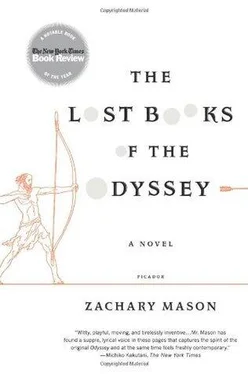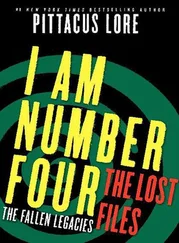It was only as we sailed out of Ithaca harbor that I told them we would retrace my long trip home. Our first port of call was Phaeacia, which we reached in five days of peaceful sailing. We entered the empty harbor at noon. The quiet was profound and we were unsurprised to see the city abandoned. Young trees grew from cracks in the city wall and the rotting remnants of a pier swam below the water’s surface. On the quarantine island in the middle of the harbor was a hospital from whose eaves hung beehives, the swarms droning away the afternoon. A herdsman lay in the grass as his cattle drank from a stream gurgling over the beach. When I hailed him he started, gave us a fearful look and hurriedly drove his charges into the woods with great whacks of his stick. The men, eager as hounds, were all for pursuing him but I demurred and we sailed away.
Next was Ogygia, Calypso’s island, which seemed to have gotten smaller. I walked spryly enough to the top of the hill where I had passed the days waiting for a ship’s sails to nick the horizon (I imagined that it was thirty-five years ago — how it would have felt to look down and see the Ithacan ship bobbing in the cove). I remembered cutting timber for the raft that would bear me away and ran my hands over the axe-scarred pine trunk that had been too thick to fell. I climbed down and went into Calypso’s cave with a pang of vanity — she will be as young as when last I saw her, I thought, and for me winter has come, but the low, cool, sand-floored room was empty save for the echoes of the sea. Her bed and loom were gone and the hearth had been effaced — not even a footprint was left. It was peaceful but somehow redolent of weariness, and it felt abandoned. I wondered where she had gone but did not know where to look.
Next was Aiaia, Circe’s isle, which had been a thicket then and was a thicket now. Wolf song hung in the evening air and the young men’s eyes shone as they hefted their spears. There were signs of recent visitors — cold campfires by the anchorage, piles of smashed pottery, litter in the bushes. I hiked up the hill to Circe’s house in the failing light, my men behind with weapons ready.
The walls of her house had burned away, leaving only charred beams, flagstones and the fireplace. Names were crudely carved into the blackened stones, and the noble mantel I remembered, carved with wolves becoming men and men becoming wolves, had been pried out and taken away. Green and gold eyes watched us from the woods but they winked out one by one as the stars emerged, and soon we left.
Next was the island of the cyclops. I expected my men to chafe at venturing onto such dangerous ground but the old companions regarded the prospect with cheerful equanimity and the young men were delighted to finally risk their lives. I stood in the prow with an arrow nocked as we took the ship in toward the familiar beach. “I doubt I could shoot a rook in the heart anymore,” I said to my friends, “so it’s lucky a cyclops’ heart is so big.” As we crept up the shingle toward the wood I felt some of the old life come back and I nearly put an arrow into a boy who came running out of the trees. Contrite, I helped him up and dusted him off, and he soon recovered himself; he had seen our ship from the hill and had wanted to be first to greet us; he lived in a house, over the next rise, with his dog, parents and a sister.
He knew little about the cyclopes — they had been gone when the first colonists arrived except for an old blind one who lived alone in his miserable cave and died of unhappiness soon after men came. Where they had gone no one knew, but they had left nothing besides drawings on cave walls and old bones embedded in rock. The boy asked if we had heard of the deeds of great Odysseus, who slew a cyclops in single combat and had the stature of a god? I admitted that I had heard of that Ithacan but did not believe a word of his story and asked to see the bones.
The boy led us to a huge skeleton embedded in a cliff face. The skull had a single wide orbit flanked by fearsome tusks nearly half as long as its body. *Its posture was the record of a death agony. I had meant to go to Polyphemus’s cave but found I had no heart for lingering where my men had died so badly, so we went back to the ship and sailed for Troy.
We came within sight of that city in the hour just before sunset when the light falls in warm sheets and makes every face beautiful and every banality poignant. The city walls were higher even than in my memory, with grim silhouettes patrolling and watch fires ablaze on every tower. As the ship coasted into harbor, I had the sudden conviction that my time had come again, that all the ghosts of Troy had come up from Hell to guard their haunted city.
I hefted my spear and was glad of the Trojans in their numbers and the hopelessness of the battle into which we sailed. I felt light and free — this time, I thought, I need no stratagems. The Trojans gave a shout and one of them threw something. I jumped to the side and raised my shield — it took me a moment to realize that the bombardment was not of stones or arrows but the petals of myriad red flowers. As I lowered my shield, the petals clinging to my armor like spattered blood, the cries I had taken for defiance resolved into a chorus of welcome. As the ship came into the harbor I saw the cheerful crowds on the quay and heard the distant singing.
We berthed between a trading scow and a one-time warship, now gaily painted, its ram sawn off and white bunting strung along its sides. Ashore, vendors sold trinkets and meat cooked on sticks. Children shrieked and parents bought them sweets. My men were delighted — the young ones could barely contain their excitement long enough to tie up the ship before running off to buy tickets, have caricatures drawn, talk to girls, and watch puppet shows — I winced to see a marionette Ajax slaughtering Deineira on a plywood altar amid a welter of fluttering red rags. My old companions took themselves off the ship more gingerly but were pleased to have a stroll in the city that had been the focus of so many years’ ambition but which they had never really seen, always having been besieging it or burning it or sailing away.
I walked through Troy jostled by families of every nation. Shops sold drinking cups, gilded statuettes and oddments of armor. There was the square where I had chafed my hands over a fire and drunk the wine of a Trojan patrol, posing as one of them, regaling them with lies. There was a reconstruction of Cassandra’s ancient house, though I thought it might be in the wrong street.
Actors worked the crowd, aping famous Greeks and Trojans. I counted four Achilleses, three Hectors, one Patroclus and two each of Priam and Agamemnon. All of them were better-looking than their originals, except for the Achilleses, which I imagined could not be helped. The crowd cleared for a staged combat in which a Hector and a swashbuckling Achilles clacked wooden swords and bellowed insults, often with double entendres. (I remembered Hector and Achilles fighting at dawn in the wasteland between the city and the camp — Hector’s focus, discipline and flares of inspiration against Achilles’ luminous relentless hatred. They chose the same moment to stop attacking and wait, watching for an opening, the glowing empty space between them vivid in the sudden stillness.) Another actor brushed past me, his face made up in a leer of cruel cunning and an oversized bronze bow in his hand, and after a moment I recognized myself. I watched the actor mount a raised stage to join a handsome actress in a long red wig who wore an expression of beatific sadness while pretending to weave.
As the sun set, I pushed my way through the crowds and out the gates, walking up into the hills from which I could see the city and all its precincts. That was where Agamemnon had his camp, I thought, and that is where Achilles had his funeral games. That ribbon of distant brightness must be the Scamander and that ragged mouth in the old wrecked walls the gate we took the horse through. I said to myself, “Somewhere I must have made a mistake. Turned down the wrong street, opened the wrong door, failed to make a sacrifice when the god was willing. And now I am old and not far from nothing, and everything I knew has turned to smoke.”
Читать дальше












